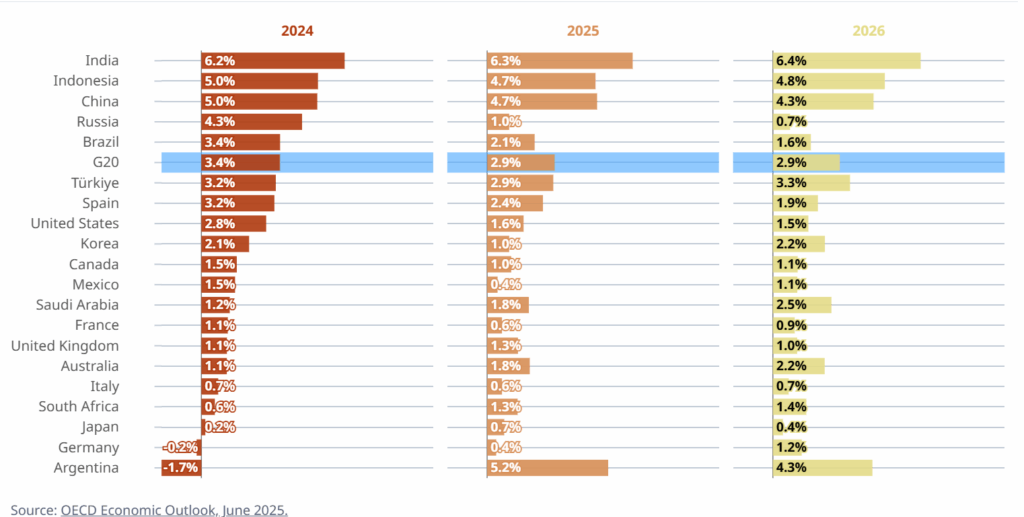The global economy faces new challenges as trade policy uncertainty and rising protectionism threaten economic growth. In its latest Economic Outlook report, the Organisation for Economic Co-operation and Development (OECD) warns that the world economy is growing more slowly than expected and warns of risks associated with trade disruptions, geopolitical tensions and climate change.
According to the OECD, global GDP growth in 2025 is estimated at 3.1 %, down slightly from the previous forecast of 3.2 %. For 2026, only a slight improvement to 3.2 % is expected. "The global economy is losing momentum amid growing trade policy uncertainty that could seriously disrupt investment, trade and growth," said the OECD Secretary-General Mathias Cormann. The report highlights that protectionist measures such as tariffs and trade barriers are holding back international trade, which is a key driver of economic activity.
Rising geopolitical tensions and changes in trade policies, especially between major economies such as the US, China and the European Union, are increasing uncertainty for businesses. The OECD estimates that global trade in products and services will grow by only 2.8 % in 2025, significantly lower than the average of 4.5 % over the past decade. This decline is partly due to new trade restrictions that disrupt supply chains and increase costs for firms and consumers.
"Trade policy has become a key source of uncertainty, holding back investment and raising prices for consumers," said the OECD's chief economist Clare Lombardelli. "An open, rules-based trading system is essential to ensure strong and sustainable growth. We call on governments to resist protectionism and promote multilateral cooperation."

The report also highlights regional differences. In the US, GDP is expected to grow at 2.6 % in 2025, down from earlier estimates due to a slowdown in consumer spending and uncertainty around trade policies. The eurozone is expected to grow at 1.4 %, with Germany facing weaker performance due to its reliance on exports. In contrast, emerging economies such as India could grow faster, by 6.5 % in 2025, due to strong domestic demand.
The Czech Republic faces similar challenges. The OECD estimates that GDP growth in the Czech Republic will reach around 1.5 % in 2025, a slight improvement on previous years but still below its long-term potential. Weaker growth in Germany, the Czech Republic's main trading partner, is negatively affecting industrial production and exports, especially in the automotive and engineering sectors. Uncertainty in trade policies and disruptions in supply chains are increasing costs for Czech firms, which may limit investment. According to the OECD, inflation in the Czech Republic could fall to 2.2 % in 2025, close to the Czech National Bank's target, but risks related to energy prices and global supply remain. The Czech Republic could benefit from investment in green technology and digitalisation, which the OECD recommends as a path to more sustainable growth.
Inflation remains another challenge. The OECD forecasts that average inflation in G20 countries will fall from 6.1 % in 2024 to 3.8 % in 2025, but remains above central bank targets in some countries. "Central banks need to remain vigilant and ensure that inflation falls to sustainable levels without dampening economic activity too much," Lombardelli added. The report suggests that interest rates could remain higher for longer, which could curb investment and consumption.
The OECD also stresses the need for investment in green technologies and infrastructure to support the transition to a sustainable economy. Climate change increases risks to agriculture, energy and supply chains, which can further weaken growth. "Investing in resilient infrastructure and green transformation will not only mitigate the impacts of climate change, but also support long-term growth and job creation," said Cormann.
The OECD calls on governments to take action to strengthen economic resilience. Key recommendations include promoting open trade, investing in education and workforce skills, and accelerating green transformation. The report also stresses the need for fiscal prudence to avoid excessive debt that could jeopardise future stability.
"We must act quickly to strengthen global cooperation and restore confidence in a rules-based trading system," Cormann concluded. The OECD warns that without a coordinated effort, trade policy uncertainty and other global challenges could lead to a prolonged period of weak growth.
OECD/gnews.cz - GH



